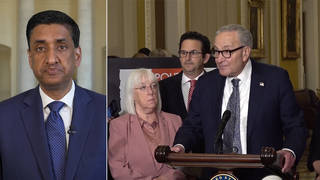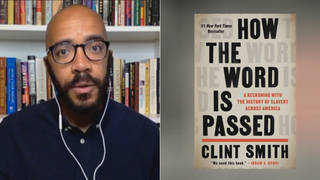
By Amy Goodman & Denis Moynihan
“What, to the American slave, is your Fourth of July?” asked Frederick Douglass, speaking to the Rochester Ladies’ Anti-Slavery Society on July 5th, 1852. Douglass escaped slavery around the age of 20, and, by the time he gave this speech at 34, was a renowned abolitionist, author and orator. “I answer: a day that reveals to him, more than all other days of the year, the gross injustice and cruelty to which he is a constant victim. To him, your celebration is a sham.” Douglass’ powerful words and tireless organizing helped educate and mobilize the nation for abolition, to support the Underground Railroad, and, ultimately, to wage an incredibly costly civil war to permanently stamp out slavery. His words, indeed his life, stand as a striking example of why we need a deep, critical understanding of our unvarnished national history if we hope to address the problems that now confront us. Yet a well-organized movement is spreading to obscure and obliterate much of our history, to ban books, and to compel the teaching of a sanitized rendition of our difficult and often bloody past.
One of the seminal texts that focuses on ignored or suppressed U.S. history is the classic book by the late historian Howard Zinn, “A People’s History of the United States.” Since its publication in 1980, more than four million copies have been printed. The book presents a sweeping account of everything from the genocide perpetrated by Christopher Columbus, to the forgotten heroes in the struggles for labor rights, women’s rights, and the peace movement. The book became so popular that Zinn and publisher Anthony Arnove put out a companion volume, Voices of a People’s History of the United States, packed with source material, including writings, speeches and more from scores of historical figures that “have mostly been shut out of the orthodox histories, the major media, the standard textbooks, the controlled culture,” as they write in the book’s introduction.
“When I became a historian, I already knew that I was not going to be neutral,” Howard Zinn explained on the Democracy Now! news hour in 1999.
Zinn and Arnove began producing live readings from “Voices,” with prominent actors and writers presenting these historical texts, bringing them to life. Oscar-winner James Earl Jones presented Frederick Douglass’s critique of the Fourth of July, in his well-known basso profundo:
“At a time like this, scorching irony, not convincing argument, is needed. O! had I the ability, and could reach the nation’s ear, I would, today, pour forth a stream, a fiery stream of biting ridicule, blasting reproach, withering sarcasm, and stern rebuke. For it is not light that is needed, but fire; it is not the gentle shower, but thunder. We need the storm, the whirlwind, the earthquake. The feeling of the nation must be quickened; the conscience of the nation must be roused; the propriety of the nation must be startled; the hypocrisy of the nation must be exposed; and the crimes against God and man must be proclaimed and denounced.”
Howard Zinn died in 2010, but his work continues. Anthony Arnove and Haley Pessin co-edited a new volume, “Voices of a People’s History of the United States in the 21st Century: Documents of Hope and Resistance.” Like its predecessor, the book also covers movements, but from recent decades, including the opposition to the invasion and occupation of Iraq to the uprising in Ferguson, Missouri for racial justice to Occupy Wall Street, the MeToo movement and resistance to the Trump administration.
“I was lucky to have A People’s History of the United States as one of the textbooks that we read,” Pessin said on Democracy Now! “I really read it voraciously, in a way that no textbook had ever really grabbed my attention.”
That very influence on young students is the target of the fast-growing far-right organization called “Moms for Liberty.” Claiming to have grown to 285 chapters with 100,000 members since its founding in 2021, the group seeks to control school curriculum, banning topics its white leadership deems offensive. Moms for Liberty just held its annual convention in Philadelphia – the birthplace of the U.S. Constitution and the first city that Frederick Douglass reached in his daring escape from slavery in 1838. Most of the major GOP presidential contenders addressed the pro-censorship gathering, including Donald Trump and Florida Gov. Ron DeSantis, while thousands protested outside.
As threats to free speech and the teaching of our nation’s genuine history mount, it is worth recalling the answer Benjamin Franklin gave to a member of the public who asked him in 1787, about the new constitution he had just helped draft, “Do we have a republic or a monarchy?” Franklin replied, “A republic madam, if you can keep it.”











Media Options